text ©2014
On Sunday February 9 during the 10th edition of Identità Golose, Bavarian-born Heinz Beck, Rome’s only chef with three Michelin stars, was awarded the title of “Chef of the Year 2014.” Paolo Marchi, the Founder and Director of Identità Golose, and Casimiro Maule, of the winery “Nino Negri” at Chiuro in Valtellina, explained their motivation: “We decided to give this award to Heinz because, although he is Italian by adoption, more than any other Italian chef, for the past twenty years he has publicized the excellent cuisine and the flavors of our “Bel Paese” beyond our borders. In addition, Beck has always demonstrated a sincere interest for culinary developments in the ambience of health and wellness. At his rooftop restaurant, “La Pergola,” the cuisine is authentically gourmet yet imaginative, but also healthy. Last but not least, its service in the dining room, constantly courteous and attentive to every detail, contributes to creating an unforgettable supper.”
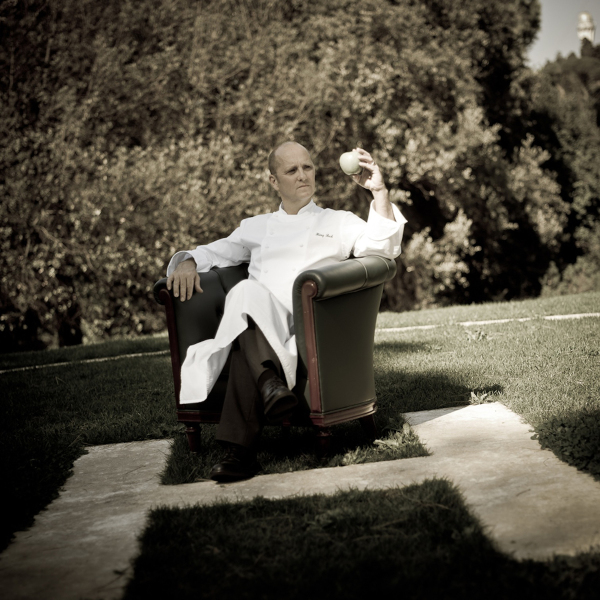
This year you are celebrating your 20th anniversary at La Pergola. What type of celebrations do you have in mind?
As I said at Identità Golose we’ve put together a tasting menu, which we’ll serve to 999 guests and then no more. The exact anniversary dates to October, but we started serving the menu in the spring and will continue through to the end of the year.
Can you describe the menu’s dishes?
It’s a menu that looks to the future and includes only two of my “historical” dishes: Zucchini Flowers, and Fagottelli La Pergola. We also included some dishes we’ve recently put on the menu and then some new additions that have never been on our menu before. That way at least 30% of the tasting menu has never have been on a previous menu.
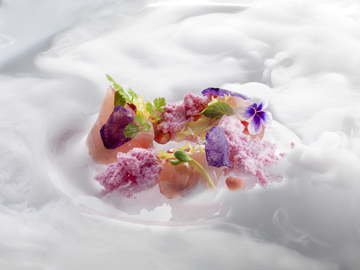
Amberjack marinated in white balsamic vinegar with pomegranate snow
How many “tastes” does it include?
Twelve, five of which: an antipasto, a pasta, an intermezzo, a main dish, and a dessert, will never have been on our menu. Here’s the full menu: amberjack marinated in white balsamic vinegar with pomegranate snow; tomato ring with croutons and red shrimp tartare; smoked scallop tartare in a red beet shell; Eden; fagottelli La Pergola; deep-fried zucchini flower with caviar on shellfish and saffron consommé; cod with celery sauce and curry crust; sottobosco (woodland); “looking for” ossobuco; lamb cube on tomato sauce, salty ricotta and basil; sole; and Iced sphere of red fruit on tea cream with crystallized raspberries.
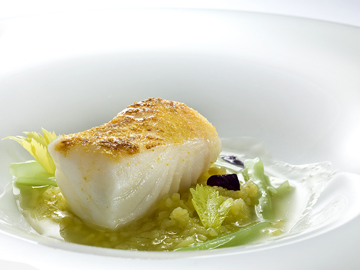
Cod with celery sauce and curry crust
So the commemorative menu is a fixed one or do your guests get some choice?
No, it’s a fixed tasting menu. Of course, we’re continuing to propose other tasting menus and our à la carte menu. With our anniversary commemorative menu we intend to show where we’ve come from, where we are today, but above all where we want to go, our final goal. Usually such commemorative menus are a time chart of “historical” dishes. Instead my spirit is to keep going ahead, to never look or turn back.
My goal is to train young chefs at the start of their careers and to help them grow. My anniversary menu has to reflect this intention of mine. It has to reflect 360° what I’ve learned here at La Pergola over the past 20 years. However, with this anniversary menu I don’t want to say that my “historical” dishes are not good, but I think that cooking and eating are in constant evolution, are constantly improving so that’s why it’s important to look to the future.
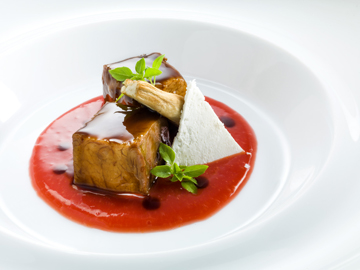
Lamb cube on tomato sauce, salty ricotta and basil
Besides the menu you do have any other celebration ideas?
For certain we’ll be serving this menu at our partner, the Waldorf-Astoria in New York. Every guest who orders the menu will receive a plexi-glass commemorative plaque signed and dated by me.
It’s well known that you wanted to be a painter, but that your father was against it. The styles of many painters undergo changes during their careers. How has your style as a chef changed in these 20 years?
From a traditional style we moved on to serving imaginative side dishes. From there we started to use modern cooking techniques and then moved on to paying attention to health issues. Lately, we’ve started to lighten our dishes to bring out their various individual flavors. The more you lighten a dish, the greater emotions its flavors have. So my career has had five distinct and very different styles.
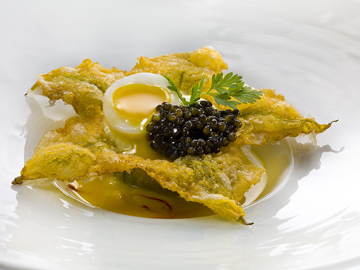
Deep-fried zucchini flower with caviar on shellfish and saffron consommé
In a nutshell how would you define Heinz Beck’s cuisine of today?
Heinz Beck’s cuisine is modern, healthy, with Mediterranean ingredients and flavors because mankind never invents anything really. What does that mean? It means that we are rich culturally and gastronomically speaking, that we’ve grown during the past 1,000 years and that with this background we develop our cuisine to adapt it to modern life and today’s population, which has changed its lifestyle and eating habits during the last 50 years. Our research has helped us uncover new ways of doing things and we use all these new techniques to improve our nutrition and not to over enrich our dishes, to show that a fine dining restaurant with three Michelin stars like La Pergola can serve light dishes without renouncing emotion.
If we talk about diets and healthiness or lightness, we incorrectly have the concept that it means giving up emotion and flavor. For years now I’ve been working to develop a cuisine that has to remove ingredients, that must not add, because, if I invent a dish and add, add, add, it’s much easier than removing ingredients. The more ingredients I remove, the more difficult it is to balance the dish.
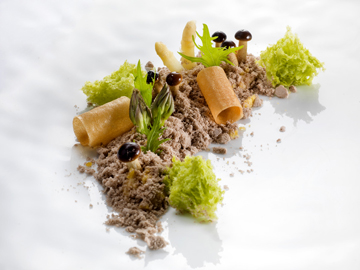
Sottobosco
(woodland)
Is the aesthetic aspect of a dish, and not only its taste, essential for you?
Creating a new dish must be done at different levels. First I get the idea. Then I have to balance its taste, its sensual sensations. Then comes its beauty to the eye. It’s in that order of importance. The most important aspect is that the dish inspires emotions; then that the dish is easy to digest, and lastly that the dish is pretty to look at of course.
To return to the Paolo Marchi’s motivation, how is your cuisine healthy?
Mankind today eats to give energy and nutrients to our organism and to be more resistant to disease. Eating helps to prevent us from catching diseases. For example, malnutrition is a disease; vitamin deficiency is a disease. Cancer is often, although not always, connected to eating. What can we do to prevent this? Our cuisine has to give to our bodies the perfect food combinations that respect the complete energy requirements of our organism. Food needs to nourish us. It needs to be well prepared for an organism undergoing evolution. Our organisms have evolved because we live longer thanks to an ever-changing lifestyle. Changing our lifestyle and benefitting from ever-improved medicines, we must take better care of our organisms by eating healthily, so as not to develop pathologies which derive from unhealthy nutrition like Type 2 diabetes, cholesterol, cirrhosis of the liver, and high blood pressure.
Therefore, when I prepare my menus, I have to be extra careful not to invent dishes that create problems or damage to my guests’ health. This is the goal I’ve been striving for for more or less the past 15 years, since around the year 2000. My cuisine has to be at a very high level; it must inspire strong emotions because my guests come to a restaurant with three Michelin stars to enjoy a special occasion, but as the chef I can’t forget that I must take care of their health. To begin with I started to eliminate everything superficial to achieve a well-balanced, tasty, inspirational, but not over-seasoned dish with too many conflicting flavors. I would like to emphasize that I don’t create a dietetic cuisine, rather an inspirational one. I’m not a doctor, a dietician, or a nutritionist; I’m a chef who invents creative, tasty dishes and who pays attention to the wellbeing of my guests. I don’t invent diets.
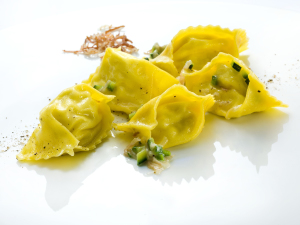
Fagottelli
Are your dishes: “zucchini flowers with consommé, seafood, and saffron” and “fagottelli ‘La Pergola’” still the all-time favorites on the menu after 20 years, or have they been replaced by new favorites?
No, those are still the dishes I care most about. The zucchini flower is so sunny, so beautiful, the way I am too. I’m a sunny person and I see much of myself reflected in this dish. Then the “fagottello” is homage to Rome. I created it 15 years ago. It’s become the symbol of Heinz Beck, the symbol of La Pergola, so it always has to be on the menu.
Which of your dishes is irresistible also for you?
Have you ever asked a mother which of her children she loves the most? I don’t have dishes of mine that I love more and dishes of mine that I love less.
What’s never missing from your refrigerator at home?
Extra-virgin olive oil, 36-month-old Parmesan, which is unbelievably delicious, and pasta. Both at home and at La Pergola, “De Cecco” pasta is never missing. I’m convinced it’s the best industrial pasta on the market. My passion for pasta was born long before my working relationship with “De Cecco,” but ever since my first taste I’ve remained faithful even if I’ve tasted many other brands which I’m sent to taste. The more I taste other brands, the more I’m convinced that “De Cecco” is the one I love the most. Then at home we eat lots of fruits and vegetables. I especially love artichokes and tomatoes. I love the fruit in season: oranges, all citrus fruits from Sicily during winter, and cherries and peaches in summer. I love pasta with olive oil and freshly grated Parmesan. It’s a dish for sick people, but I love it.
I interviewed you for the first time eleven years ago. When I asked you why you did not appear on TV, why you did not open additional restaurants like so many other chefs etc., you answered me that your place was in front of your stove here at La Pergola. However, this is no longer the case. Can you explain this change? Why did you choose London and not somewhere else to open your second restaurant? How do you now divide your time between your several restaurants in Rome, Pescara, Siena, London, the Algarve, Dubai, and Oman?
You probably don’t know this, but last year was the year in which I was absent the most evenings in my 20 years at La Pergola: that is, three evenings.
I chose London because I wanted to open a second restaurant in an international city. I received numerous other location proposals, but London seemed the best choice. Besides being very international, London is in Europe so not that far from Rome. London also has very high standards when it comes to high quality, yet ever-evolving cuisine. As for the other later restaurants, they just evolved one after the other. The restaurant in Dubai is in another Waldorf property, so I couldn’t refuse. Dubai is another very international place; it’s a capital of good taste where you can find all the ingredients you need and all the cuisines of the world, whereas Oman is very traditional and down-to-earth.
So how do you manage?
We’re closed Sunday and Monday at La Pergola and we’re open only in the evenings anyway. I take the earliest outgoing available flight on Sunday morning and return on Tuesday afternoon. None of my restaurants are more than a five-hour flight from Rome. I also go to Tokyo, where I will open a restaurant named “Heinz Beck” after me, but I never miss and never will miss a day of work here at La Pergola. At Alitalia they all know me because, when I go to Tokyo, I have the same crew going and returning. By now they all know who I am.
The only place where it would be difficult for me to open and then oversee a restaurant is Australia because it’s too far away.
Do you go abroad for consultancies or do you cook?
I cook, cook, and am always cooking.
So you go to each place every five or six weeks?
But, no. You have to understand that I go to my three restaurants in Italy in the mornings when I’m free. For now my restaurants abroad are only three and I go to each one of these once a month to cook on Sundays and Mondays, both at lunch and a supper.
Can you explain the significance of the entry “Beckool” on your website?
I’ve employed only young people. It’s an idea for renewal, development, and motivation for young people because they are our future. Without young people we would go nowhere. The basic economy of the restaurant business is our new recruits. If we don’t motivate and teach our new recruits, we’ll go nowhere. We’ll also lose our know-how. For the past 20 years at La Pergola I’ve employed only young people. They are all Italian. Actually that’s not entirely true because I’m German and Anna our hostess is Slovak.
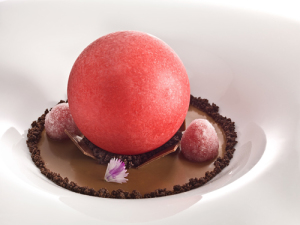
Iced sphere of red fruit on tea cream with crystallized raspberries
Do you have “Heinz Beck boys” like Gualtiero Marchesi?
Yes, I have 10 or 11 ex-interns or chefs who have earned their own Michelin stars.
We saw each other at Identità Golose last year and this year in February; you certainly don’t need publicity, so why does a chef as famous as you participate at such events?
I’m one of those chefs who participates at very few events. I go to Identità Golose for the young people who come. Identità Golose is full of young chefs who need an updating on the way the restaurant business is developing. It’s important for them to attend for that reason, to see and be stimulated by what other top chefs and I are doing, so as to improve. I go to encourage these young chefs; otherwise it’s just exhausting. This past February Sunday morning I caught the 6 AM flight to the Algarve. That meant that I didn’t sleep on Saturday night. I cooked lunch and supper in the Algarve before catching the 6 AM flight to Milan. This meant I didn’t sleep at all the second night either. Then I did my demonstration at Identità Golose and took the train back to Rome. I go to Identità Golose out of passion and out of duty to transmit something useful to the young chefs who attend. It’s a splendid event and I have to say that Paolo Marchi is doing a great job for the chefs of the younger generation.
You continue not to appear on TV or am I wrong?
No, I appear on TV because it’s important to publicize yourself. Television is means of communication. I appear regularly on TV for a period of time and then not for a period of time. I don’t try to be omnipresent on TV. Most importantly, when I do appear on TV, I try my best not to take time away from my presence at La Pergola. This means that I tape my appearances or I appear live on the days that La Pergola is closed. I don’t think that another chef exists who is more present at his restaurant than I am. During my first years at La Pergola I never missed a meal. As I’ve already said, last year I missed three. I’m very lucky because during the past five years I’ve never been sick and never took any medicine, not even an aspirin. My good health is also due to my healthy eating habits: lots of fruits and vegetables.
What’s the secret of your success? What is unique about La Pergola?
We never stop. We keep going full speed ahead, updating ourselves, working non-stop to give the very best to our guests. This is especially true of the past five years when I started world-wide publicity campaigns and started traveling myself. These efforts are starting to pay off now. This means that during the past five years almost every weekend I’m on the road doing promotions either here in Italy or abroad. By opening restaurants all around the world I’ve created a network not to mention many, many jobs. The force behind all this is crucial and I’m the driver. I don’t spare myself. We have to update ourselves constantly, update, update, update, improve, improve. As I said at Identità Golose I won the award “Chef of the Year 2014” for my continual search for development and creativity, and because I’ve always gone forward even in these times of economic crisis. In these difficult times it’s essential to have the motivation to improve yourself and to keep going always.
How has La Pergola reacted in this present economic crisis?
We’ve been full almost every evening for the past 17 years.
You always look to the future; so do you have a pipedream?
I have so so many dreams for the future, but right now my dream is for Italy to overcome its political and economic crisis, which is severely damaging the country, and for her to return to her past splendor. With its numerous unique cultural sites, its magnificent countryside, and delicious cuisine, Italy is so special that she doesn’t deserve her present-day predicament.
& & &
